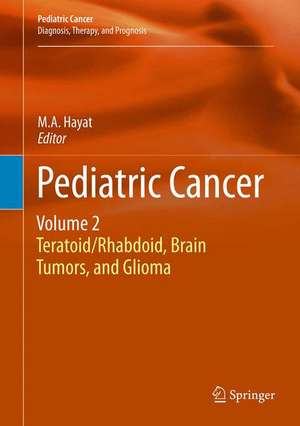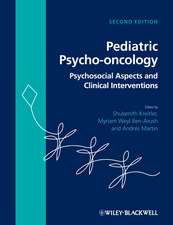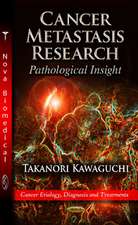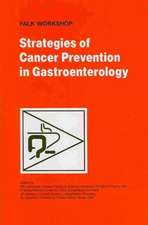Pediatric Cancer, Volume 2: Teratoid/Rhabdoid, Brain Tumors, and Glioma: Pediatric Cancer, cartea 2
Editat de M.A. Hayaten Limba Engleză Hardback – 21 mar 2012
| Toate formatele și edițiile | Preț | Express |
|---|---|---|
| Paperback (1) | 1310.55 lei 38-44 zile | |
| SPRINGER NETHERLANDS – 23 aug 2016 | 1310.55 lei 38-44 zile | |
| Hardback (1) | 1427.62 lei 6-8 săpt. | |
| SPRINGER NETHERLANDS – 21 mar 2012 | 1427.62 lei 6-8 săpt. |
Preț: 1427.62 lei
Preț vechi: 1502.76 lei
-5% Nou
Puncte Express: 2141
Preț estimativ în valută:
273.22€ • 282.82$ • 230.92£
273.22€ • 282.82$ • 230.92£
Carte tipărită la comandă
Livrare economică 05-19 martie
Preluare comenzi: 021 569.72.76
Specificații
ISBN-13: 9789400729568
ISBN-10: 9400729561
Pagini: 450
Ilustrații: XXII, 352 p.
Dimensiuni: 178 x 254 x 20 mm
Greutate: 0.86 kg
Ediția:2012
Editura: SPRINGER NETHERLANDS
Colecția Springer
Seria Pediatric Cancer
Locul publicării:Dordrecht, Netherlands
ISBN-10: 9400729561
Pagini: 450
Ilustrații: XXII, 352 p.
Dimensiuni: 178 x 254 x 20 mm
Greutate: 0.86 kg
Ediția:2012
Editura: SPRINGER NETHERLANDS
Colecția Springer
Seria Pediatric Cancer
Locul publicării:Dordrecht, Netherlands
Public țintă
ResearchCuprins
Part I Teratoid/Rhabdoid.- 1. Pediatric Atypical Teratoid/Rhabdoid Tumors (An Overview).- 2. Pediatric Atypical Teratoid/Rhabdoid Tumor .- 3. Pediatric Rhabdomyosarcoma: Role Of Cell Cycle Regulators Alteration.- 4. Pediatric Atypical Teratoid/Rhabdoid Tumors: Imaging With Ct And Mri.- 5. Pediatric Atypical Teratoid/Rhabdoid Tumor: Diagnosis Using Imaging Techniques And Histopathology.- 6. Pediatric Atypical Teratoid/Rhabdoid Tumors: Differential Diagnosis.- Part II Brain Tumors (General).- 7. Pediatric Brain Tumors (An Overview).- 8. Pediatric Cns Primitive Neuroectodermal Tumor: Role Of The Wnt Pathway.- 9. Neuroblastic Tumors: Status And Role Of Her Family Receptors.- 10. Children With Neurofibromatosis Type 1: Positron Emission Tomography.- 11. Metabolite Profile Differences In Childhood Brain Tumors: 1h Magic Angle Spinning Nmr Spectroscopy.- 12. Central Nervous System Imaging In Childhood Leukemia.- 13. Immunohistochemistry In The Differential Diagnosis Of Adult And Pediatric Brain Tumors.- 14. Children With Brain Tumors: Role Of The Neurosurgeon.- 15. Pediatric Intraventricular Brain Tumors: Endoscopic Neurosurgical Techniques.- 16. Neurosurgical Management Of Pediatric Brain Tumors.- 17. Pediatric Brain Tumor Biopsy Or Resection: Use Of Postoperative Nonnarcotic Analgesic Medication.- 18. Clinical Trials In Pediatric Brain Tumors; Radiotherapy.- 19. Epileptic Seizures And Supratentorial Brain Tumors In Children.- 20. Postoperative Pain In Children: Advantage Of Using Nonnarcotic Analgesic Regimen.- 21. Pediatric Brain Tumors: Application Of Stratification Criteria To RefinePatient Management.- 22. Pediatric Supratentorial Primitive Neuroectodermal Tumor: Treatment With Chemotherapy And Radiation.- 23. Pediatric Cancer Survivors: Neurocognitive Late Effects.- 24. Adult Survivors Of Pediatric Cancer: Risk Of Cardiovacular Disease.- Part III Gliomas.- 25. Pediatric Glioma: Role Of Platelet-Derived Growth Factor Receptor.- 26. An Overview Of Pediatric High-Grade Gliomas And Diffuse Intrinsic Pontine Gliomas.- 27. Pediatric Low-Grade Glioma: The Role Of Neurofibromatosis-1 In Guiding Therapy.- 28. Treatment Of Pediatric Optic-Hypothalamic Gliomas: Prognosis.- 29. Pediatric Low-Grade Gliomas: Advantage Of Using Lower Doses Of Cisplatin/Etoposide.- 30. Pediatric Paragangliomas: Role Of Germline Mutation In Succinate Dehydrogenase.
Textul de pe ultima copertă
Pediatric Cancer: Teratoid/Rhabdoid, Brain Tumors, and Glioma
· Epilepsy prognosis and treatment
· Symptoms of tumors in children
· Diagnostic imaging technology
This second volume in the Pediatric Cancer series edited by Professor M.A. Hayat presents a general introduction to the principles of diagnosis and treatment of children with brain tumors.
*Cancer is the leading cause of death by disease among U.S. children between infancy and age 15. Approximately 11,210 new cases of pediatric cancer are expected to be diagnosed in children 0–14 years of age in 2011.
A complete resource for researchers in the symptoms of tumors in children, epilepsy prognosis and treatment and diagnostic imaging technology, this volume presents and discusses:
· Molecular characterization of solid tumors,
· The role of molecular pathways providing putative targets for new therapies.
· High resolution magic angle spinning NMR spectroscopy, to determine metabolic profiles for small pieces of intact tissue and whole cells in culture,
· The differences between adult and pediatric brain tumors,
· The role of tumor suppressor genes and oncogenes in the development and progression of human malignancies, · Various neuroradiological imaging modalities in children with leukemia,
This volume also examines in detail the results of clinical trials using radiotherapy in pediatric brain tumors, such as medulloblastoma, ependymoma, craniopharyngioma, low-grade glioma, high-grade glioma, brainstem glioma, and germ cell tumors.
Aimed at researchers and medical oncologists, Pediatric Cancer volume 2, will also be of interest to medical technicians, pharmaceutical companies and of course, medical libraries.
Professor M.A. Hayat is Distinguished Professor at the Department of Biology, Kean University NJ, USA.
*National Cancer Institute, National Institutes of Health, U.S. Department of Health and Human Services http://www.cancer.gov/aboutnci/servingpeople/cancer-statistics/snapshots
· Epilepsy prognosis and treatment
· Symptoms of tumors in children
· Diagnostic imaging technology
This second volume in the Pediatric Cancer series edited by Professor M.A. Hayat presents a general introduction to the principles of diagnosis and treatment of children with brain tumors.
*Cancer is the leading cause of death by disease among U.S. children between infancy and age 15. Approximately 11,210 new cases of pediatric cancer are expected to be diagnosed in children 0–14 years of age in 2011.
A complete resource for researchers in the symptoms of tumors in children, epilepsy prognosis and treatment and diagnostic imaging technology, this volume presents and discusses:
· Molecular characterization of solid tumors,
· The role of molecular pathways providing putative targets for new therapies.
· High resolution magic angle spinning NMR spectroscopy, to determine metabolic profiles for small pieces of intact tissue and whole cells in culture,
· The differences between adult and pediatric brain tumors,
· The role of tumor suppressor genes and oncogenes in the development and progression of human malignancies, · Various neuroradiological imaging modalities in children with leukemia,
This volume also examines in detail the results of clinical trials using radiotherapy in pediatric brain tumors, such as medulloblastoma, ependymoma, craniopharyngioma, low-grade glioma, high-grade glioma, brainstem glioma, and germ cell tumors.
Aimed at researchers and medical oncologists, Pediatric Cancer volume 2, will also be of interest to medical technicians, pharmaceutical companies and of course, medical libraries.
Professor M.A. Hayat is Distinguished Professor at the Department of Biology, Kean University NJ, USA.
*National Cancer Institute, National Institutes of Health, U.S. Department of Health and Human Services http://www.cancer.gov/aboutnci/servingpeople/cancer-statistics/snapshots
Caracteristici
Epilepsy treatment and prognosis Symptoms of tumors in children Diagnostic imaging technology Differences between tumors in adults and children Color illustrations












